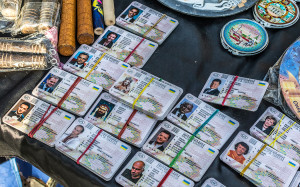 We can’t live our lives in fear, but the way our world is now, we must be educated and aware. Technology does so much good in our lives, but it has a dark side, too. Being aware and staying educated are the first steps to protecting ourselves from that dark side. These days, it only takes a few keystrokes for a criminal to have our personal information. I recently had the pleasure of meeting and having lunch with Carl Nelepovitz while in Florida. I had no idea how much I was about to learn about Cyber Security, and all the ways we mindlessly give our personal information to so many, which can then be sold or used to create problems that can follow us for years.
We can’t live our lives in fear, but the way our world is now, we must be educated and aware. Technology does so much good in our lives, but it has a dark side, too. Being aware and staying educated are the first steps to protecting ourselves from that dark side. These days, it only takes a few keystrokes for a criminal to have our personal information. I recently had the pleasure of meeting and having lunch with Carl Nelepovitz while in Florida. I had no idea how much I was about to learn about Cyber Security, and all the ways we mindlessly give our personal information to so many, which can then be sold or used to create problems that can follow us for years.
Crimes involving identity theft are constantly evolving. I can only touch the tip of the iceberg here, but hopefully it will be enough information to open some eyes and make a few drivers more aware of the real threat they are facing. Back in 2007, Carl was a victim of identity theft after losing his wallet at a gas station. It only took three hours to have his bank account emptied. Months later, when an identity theft ring was broken up, stacks of fake driver licenses, with all of Carl’s personal information but no photo, were seized. To this day, Carl doesn’t know how many of those fake licenses were sold before the remaining cards were confiscated in the raid.
Personal experience with identity theft has made Carl, a former truck driver who still hauls loads occasionally on the weekends, very passionate about this topic, and educating other drivers about the dangers we face. He also offers a plan that can help stop the unfortunate situation of identity theft before (or even after) it happens. His business is called Cyberimpac. When I asked him how he came up with that name, he told me it’s because the Cyber world has such an impact on our lives, these days.
 Even though Carl is a three-time Black Belt World Champion in karate, his fighting skills could not help him from getting hit hard and knocked down by a thief, leaving him with a permanent black eye. The only thing he knows for sure is that tomorrow someone may mistakenly knock on his door and tell him there is a warrant for his arrest, or he might get stopped and end up in handcuffs, once again, having to prove it wasn’t he they were actually looking for. This will be something he has to deal with the rest of his life. Don’t think that it can happen to you? Think again!
Even though Carl is a three-time Black Belt World Champion in karate, his fighting skills could not help him from getting hit hard and knocked down by a thief, leaving him with a permanent black eye. The only thing he knows for sure is that tomorrow someone may mistakenly knock on his door and tell him there is a warrant for his arrest, or he might get stopped and end up in handcuffs, once again, having to prove it wasn’t he they were actually looking for. This will be something he has to deal with the rest of his life. Don’t think that it can happen to you? Think again!
Did you know there are schools for hackers? People are constantly training, so they can work for the government, to try to catch the real criminals. Today, most kids love video games, and hackers will hack each other as a game. It can take under five minutes for someone to have all they need to know about you to change the life you’ve worked to build forever. Taking someone’s identity or everything they’ve worked for is no game, and there is nothing funny about it! It’s a crime and, sadly, it will continue to happen as our society and systems get more entrenched in technology.
As professional drivers, we know how important our CDL is. Having a CDL is how we make our living, but to a thief, a national license is as good as gold. It allows a thief to commit crimes under your name anywhere in North America. Many drivers I talk to, myself included, don’t like having shippers and receivers across the country making copies of our CDL. Where does that copy go and who has access to it? You must be extremely careful about who you give your CDL to and very aware of what they do with it while they have it.
Another way hackers can go after truckers specifically is through their electronic logging device (ELD). As the latest “smart” technology, these ELDs have been forced upon most drivers and create yet another vulnerability. Besides having your every move monitored, hackers can access these devices and manipulate the information. Since your location can be tracked, they know when and where you have stopped, which makes you an easier target.
 Obviously, our mobile phones and computers make us vulnerable, too. Many apps you download often ask you to agree to all kinds of ridiculous things to get the app. Be sure to read their “terms of service” and any “privacy policies” before hitting the “OK” button. You might want to ask yourself if having that app is important enough to allow the company behind it to have access to your texts, emails, microphone, camera and pictures. Seriously – let that sink in. You are giving them permission to look at everything in your phone and to eavesdrop on every conversation, voice or text. Why would you do that?
Obviously, our mobile phones and computers make us vulnerable, too. Many apps you download often ask you to agree to all kinds of ridiculous things to get the app. Be sure to read their “terms of service” and any “privacy policies” before hitting the “OK” button. You might want to ask yourself if having that app is important enough to allow the company behind it to have access to your texts, emails, microphone, camera and pictures. Seriously – let that sink in. You are giving them permission to look at everything in your phone and to eavesdrop on every conversation, voice or text. Why would you do that?
If possible, avoid using public WiFi at the donut shop or truck stop. If you are not using wireless accessories, shut off your Bluetooth connectivity. Do not open any emails or click on any links that you do not recognize or that you are not expecting. Hackers can emulate a site to look like the company you drive for or do business with, and then bait you to click a link. Once they get in to your laptop or tablet, they have access to everything – your accounts, passwords, personal information, photos and more. With that information, they can start stalking your family and friends by “phishing” (pretending to be you).
When it comes to suspicious emails, be mindful of everything. They will often come from someone you know, or at least look like that, so you must be diligent. Some simple clues to look for are misspelled words, improper grammar and incorrect punctuation. Also, think about what has been sent – ask yourself, “Does this person usually send me things like this?” When in doubt, contact the person and ask if they sent it BEFORE you open any files or click on any links. Better to be safe than sorry!
Today, drivers on the road can stay in touch and video chat with their family using services like Skype, which is so much better than the old pay phones we used for decades. But, when you are done chatting, it’s a good idea to put a piece of tape over the camera on your computer or tablet. If a hacker gets in, they can actually use that camera to spy on you. It’s a scary thought, to think that someone could be watching you.
 Facebook is the way so many of us keep in touch with friends, reconnect with old friends, and make new ones, too. But nearly every day we see a post from a friend that says, “Don’t accept a friend request from me – I’ve been hacked!” Most of the time this is just annoying, and a simple password change will correct the problem, but sometimes your friends might end up with posts that say they are from you, but they aren’t. All kinds of things are advertised on Facebook now, and there are all kinds of links you can click on and messages that you can send to friends, and many want you to forward that message to your friends, as well. The trouble with these messages is that we don’t know which ones are okay and which ones contain a virus. The solution – don’t open any forwarded messages and don’t forward anything you did not create.
Facebook is the way so many of us keep in touch with friends, reconnect with old friends, and make new ones, too. But nearly every day we see a post from a friend that says, “Don’t accept a friend request from me – I’ve been hacked!” Most of the time this is just annoying, and a simple password change will correct the problem, but sometimes your friends might end up with posts that say they are from you, but they aren’t. All kinds of things are advertised on Facebook now, and there are all kinds of links you can click on and messages that you can send to friends, and many want you to forward that message to your friends, as well. The trouble with these messages is that we don’t know which ones are okay and which ones contain a virus. The solution – don’t open any forwarded messages and don’t forward anything you did not create.
Identity theft is just one reason someone might try to hack you, but there are other reasons, too. Sometimes it is to scam you into sending them money; sometimes it is to simply collect your verified email address, so they can sell it to spammers; and sometimes it is to directly extort money from you through various practices.
One of the latest and most sinister methods of extortion involves infecting a computer or system with a type of malicious software (malware) that can block access to an infected device, and then a ransom is demanded to remove the restriction. This ransomware, as it is called, is serious business, and it doesn’t just happen to everyday people – large businesses are also being targeted, and the dollar amount goes way up when they have all the records for a large corporation under their control.
Cyber Security involves protecting your identity and your devices. There are services you can sign up for, like Carl’s, which can help stop identity theft by giving you an additional layer of protection (www.firstgolook.com), but the best line of defense is to be smart, aware and diligent. Read carefully and be a bit pessimistic – if it sounds too good to be true, it probably is. The delete button can (and should) be your best friend, so don’t be afraid to use it! Once they set the hook, you can become a big “phish” on a criminal’s line, and nobody wants to be that!
